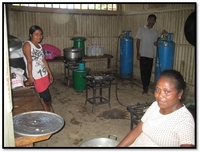UNICEF Timor Leste’s Child Friendly Schools Initiative: Assessment, Monitoring, and Strategic Planning
Timor-Leste is one of the poorest countries in the world and the poorest country in the Asia Pacific region. It consists of 13 administrative districts, including Dili, the capital. Approximately 50 percent of the country's population lives below the poverty line. Timor-Leste’s education system faces many of these same constraints and weaknesses.
 In response to the numerous challenges facing the education system following Timor-Leste’s independence in 1999, UNICEF launched a far-reaching program to help restore Timor-Leste’s system of basic education. The main objectives of this program were twofold:
In response to the numerous challenges facing the education system following Timor-Leste’s independence in 1999, UNICEF launched a far-reaching program to help restore Timor-Leste’s system of basic education. The main objectives of this program were twofold:
- First, to assist in developing a system of quality basic education in Timor-Leste through curriculum development and reform, systemic capacity building, and resource gap-filling.
- Second, to help advance the government’s goal of universal access (with a particular view to achieving gender equity) through institutional capacity building and the modernization of management and information systems to detect and address barriers to access.
At the beginning of the Government of Timor-Leste (GoTL)-UNICEFs 2009-2013 Basic Education Country Program, it was especially important to articulate a framework for action that can guide UNICEF and MECYS collaboration over the next five years of significant change in the educational system. An important step in realizing both of these ends was careful program monitoring and evaluation. Effective monitoring and evaluation permits researchers to demonstrate the efficacy (including equity and cost-effectiveness considerations) of an initiative and to document the change process to allow for replication and scale up of the initiative.
The evaluation sought to achieve several goals:
- Conduct a retrospective review of Child Friendly Schools (CFS) in Timor-Leste.
- Develop a baseline assessment and monitoring strategy that demonstrates impact of CFS in targeted focus schools.
- Frame a national, five-year strategy for engagement with CFS in Timor-Leste, including plans for how UNICEF may best use formative monitoring data to inform scale up of the initiative.
The ultimate purpose of this evaluation was to guide UNICEF Timor-Leste in an effective, efficient, and sustainable implementation of CFS programming on a national scale.